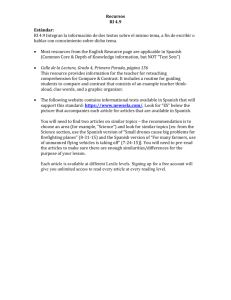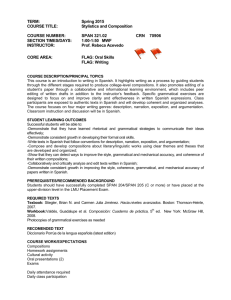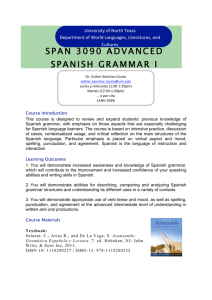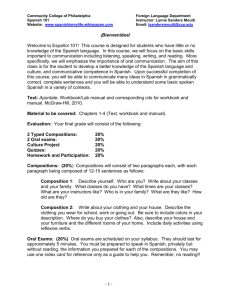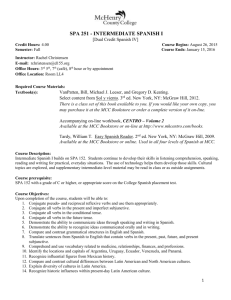SPANISH 431: Senior Seminar
advertisement
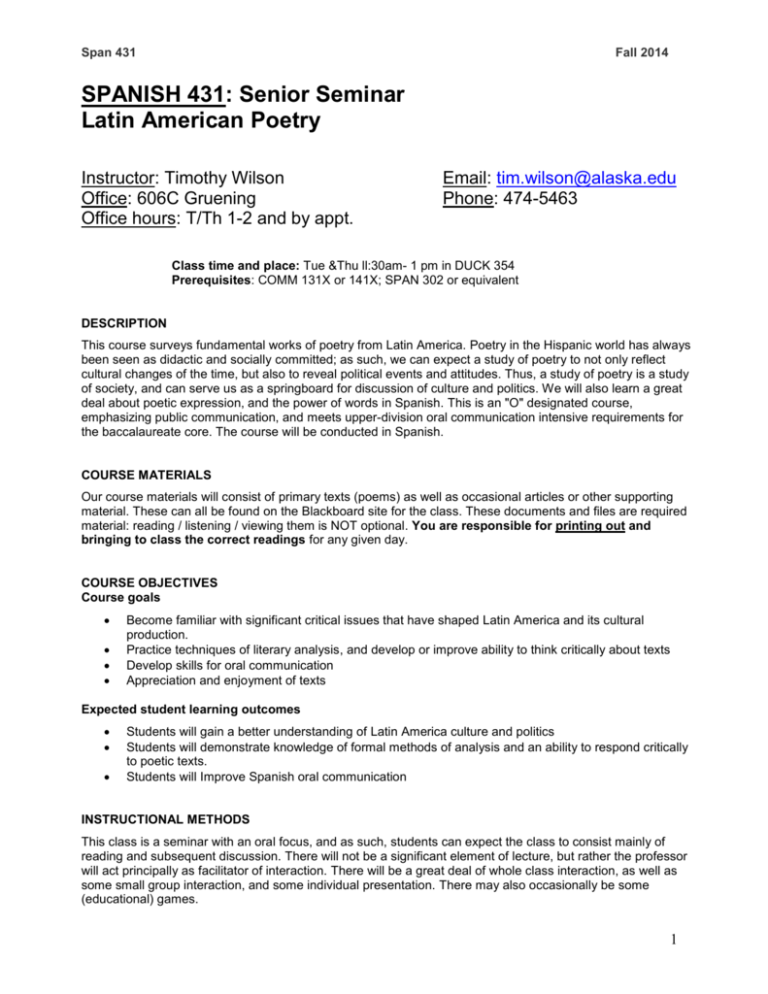
Span 431 Fall 2014 SPANISH 431: Senior Seminar Latin American Poetry Instructor: Timothy Wilson Office: 606C Gruening Office hours: T/Th 1-2 and by appt. Email: tim.wilson@alaska.edu Phone: 474-5463 Class time and place: Tue &Thu ll:30am- 1 pm in DUCK 354 Prerequisites: COMM 131X or 141X; SPAN 302 or equivalent DESCRIPTION This course surveys fundamental works of poetry from Latin America. Poetry in the Hispanic world has always been seen as didactic and socially committed; as such, we can expect a study of poetry to not only reflect cultural changes of the time, but also to reveal political events and attitudes. Thus, a study of poetry is a study of society, and can serve us as a springboard for discussion of culture and politics. We will also learn a great deal about poetic expression, and the power of words in Spanish. This is an "O" designated course, emphasizing public communication, and meets upper-division oral communication intensive requirements for the baccalaureate core. The course will be conducted in Spanish. COURSE MATERIALS Our course materials will consist of primary texts (poems) as well as occasional articles or other supporting material. These can all be found on the Blackboard site for the class. These documents and files are required material: reading / listening / viewing them is NOT optional. You are responsible for printing out and bringing to class the correct readings for any given day. COURSE OBJECTIVES Course goals Become familiar with significant critical issues that have shaped Latin America and its cultural production. Practice techniques of literary analysis, and develop or improve ability to think critically about texts Develop skills for oral communication Appreciation and enjoyment of texts Expected student learning outcomes Students will gain a better understanding of Latin America culture and politics Students will demonstrate knowledge of formal methods of analysis and an ability to respond critically to poetic texts. Students will Improve Spanish oral communication INSTRUCTIONAL METHODS This class is a seminar with an oral focus, and as such, students can expect the class to consist mainly of reading and subsequent discussion. There will not be a significant element of lecture, but rather the professor will act principally as facilitator of interaction. There will be a great deal of whole class interaction, as well as some small group interaction, and some individual presentation. There may also occasionally be some (educational) games. 1 Span 431 Fall 2014 EVALUATION To measure the expected learning outcomes, we will use the following resources: A. Preparation of readings (apuntes) This is an upper-division seminar. Therefore, it is not enough to simply read the required texts—it is imperative that you also think about them, take notes on them, and analyze them. One of the goals of the class is to help you establish good habits in reading and thinking critically. The best method for understanding a foreign language literary text is to 1) look up and gloss words you don’t know, 2) take notes in the margins of your observations and insights and 3) write up a short interpretation/summary of the work. To help with this last step, I will supply you with a simple form that should be used for taking notes on the main information about each work, and for writing out your interpretation of. This daily preparation form will be collected and graded. Though it may not be collected every day, each day it will be assumed that you have filled it out, and you should expect to be called on to answer from your notes. I think you will find these forms extremely valuable; not only for class discussion, but also as review sheets come exam time, as all the information is collected in one place. If necessary, in order to evaluate your preparation, there may also be some unannounced short (pop) quizzes during the course of the semester. Your professor may also periodically check your text to see if new words have been looked up and glossed, and whether notes have been made in the margins. Your preparation for class (as reflected in the three steps described) will comprise 15% of your final grade. B. Participation (la participación) Just as you cannot learn from this class unless you have prepared for it by reading, conversely, you would not benefit as much from the readings alone as you will from the readings followed by a good discussion of them in class and the input of classmates. For that reason, and because this is an "O" designated course emphasizing public communication, participation and presentations are a highly valued aspect of your class performance and will be graded accordingly, together comprising 55% of your final grade. Participation is structured, and is graded daily (See “PARTICIPATION GRADE CRITERIA” below). From 05 points will be awarded for every class period, for a total of 10 possible points a week. Warning: As participation figures as a large percentage in your evaluation, you might be surprised to see the damage that regularly receiving 3 points or 0 points will do to your final grade. C. Presentation I (ponencia I): la introducción de una clase The guidelines for “O” designated courses state that “each student must be involved in the individual preparation and delivery of […] 3 or more presentations of at least 5 minutes duration each.” The first presentation will consist of introducing one class during the semester. Students should look through the list of topics and choose one they find interesting. On the appropriate day, the student will open class by explaining pertinent background and engaging the class with some aspect of the theme related to the readings. This does not mean that the student should analyze all the works for that day, but rather lay the groundwork in a general way; perhaps by discussing the poet, the historical period, etc. This can and should be creative and create interest for the readings. Students should expect and be able to answer questions. D. Presentation II (ponencia II): la ilustración de un poema For the second presentation, each student will choose a favorite poem of at least five lines from the readings and create a presentation (using power point or similar tools) to illustrate the poem. S/he should write out one line per slide and find a picture that goes well with the line. The student will give an illustrated poetry reading, and afterwards, explain how the images helped him/her understand the poem. E. Presentation III (ponencia III): el panel During the semester students should choose an idea that has sparked interest for them and that they wish to develop further. This topic will be written up in a two page reaction paper, due near the end of the 2 Span 431 Fall 2014 semester. The final presentations, in the form of a panel discusson, will take place at the end of the semester. Students will orally present their reaction papers to the class—meaning they describe and explain their work, not read it verbatim. An important part of this process will be a question and answer period after each presentation. (An alternative to this presentation is the option of writing an original poem or poems in Spanish, and presenting them to the class in a “poetry slam.” This will be discussed more in class. F. Midterm and Final Exam (primer examen y segundo examen) There will be one exam at midterm time covering the first half of the semester, and a final exam covering the second half. Each will include identification, short-answer questions and/or longer essay questions. The exams are designed as a concrete opportunity for students to demonstrate their comprehension of assigned readings and the concepts contained therein, as well as their ability to think about and respond critically to those texts. The exams together constitute 30% of the final grade. FINAL GRADE Components of the Final Grade and weight by percentage preparation of reading notes participation presentation 1 (Intro to a class) presentation 2 (Illustration of a poem) presentation 3 (Panel discussion) midterm exam final exam 15% 25% 10% 10% 10% 15% 15% Grading scale A+ A A- 97-100 93-96 90-92 B+ B B- 87-89 83-86 80-82 C+ C C- 77-79 73-76 70-72 D+ D D- 67-69 63-66 60-62 F 0-60 IMPORTANT DATES Sept. 19 is the last day to drop a course for a 100% refund of tuition and fees. Oct. 31 is the last day to withdraw from a course with a “W” grade on record. 3 Span 431 Fall 2014 COURSE POLICIES Appropriate class behavior This classroom will be a safe environment in which we respect each other and the views expressed, even if we don’t agree with them. I expect you to be courteous to classmates and professor at all times. Class time is to be used paying attention to me and your classmates. Please do not use it doing homework for either this class or another class. Likewise, side conversations are not acceptable. You may not agree with or approve of all the material presented in class. However, part of a university education is being exposed to and objectively analyzing texts without applying moral judgement. Texts have been chosen for their educational content and will not be subsitituted to suit individual students’ moral or or political views. As a courtesy, you should sit up so your face is visible to others in the class Cell phones, laptops and other personal devices must be turned off and put away. There will be NO texting, facebooking, or answering phones in class. See “PARTICIPATION GRADE CRITERIA” below for dire consequences. You are welcome to bring a drink or snack to class, as long as you clean up after yourself. Student responsibilities Academic integrity. Any student who violates academic integrity by plagiarizing or cheating on any assignment, whether written or oral, will receive a failing grade for the assignment and, ordinarily, for the course. You are cheating if you give or get answers on any quizzes, in-class exams, or take-home exams. You are plagiarizing if you represent the work of others as your own. This includes copy/pasting information from a website verbatim, or having someone else write all or part of an assignment for you. You are cheating if you hand in the same work for two classes. Attendance. Allowances will be made for a few reasonable and unavoidable absences, but unexcused absences will detract heavily from your grade. As dictated by the standard policy for all Spanish classes, beyond the first 2 absences, each additional unexcused absence will lower your FINAL course grade by 1.5% (and missing 14 hours of class or more will result in an automatic “F”). Therefore, if possible please let me know ahead of time if you will have to miss. Late assignments. The grade of any assignment handed in late will be lowered by one letter grade per class period missed. Late arrival. Students who arrive more than 10 minutes late or who leave the room for extended periods will be counted absent; see me if you know that you will frequently need to arrive late or leave early. Students with disabilities. UAF makes appropriate accommodations for individuals with disabilities who have been documented by the Office of Disability Services (208 Whitaker Building, 474-5655). Students with learning or other disabilities who may need classroom accommodations are encouraged to make an appointment to obtain the appropriate documentation if they do not have it. Please meet with me during office hours so that I can collaborate with the Office of Disability Services to provide the appropriate accommodations and supports to assist you in meeting the goals of the course. Student support services. UAF is committed to equal opportunity for all students. Students who are the first in their families to attempt a four-year college degree, or students whose incomes are low, have opportunities for tutorial and other forms of support from the office of Student Support Services. Please make an appointment with Student Support Services at 474-2644. 4 Span 431 Fall 2014 GENERAL PRESENTATION GUIDE While you are allowed great leeway in the presentation of your topic—in order for you to express yourself in the way you feel most comfortable and use your creativity—there are still a few guidelines that must be followed to ensure quality of presentations. Please think carefully about these points before preparing and giving your ponencia. Does the presentation have a coherent main idea or focus? Please know what you are presenting on, and stick to that topic. It is very helpful if you know what you want to accomplish with the presentation: have a goal. Is there a well thought-out and logical organization to the presentation in general? Unless you are a natural born entertainer—and perhaps even then—it is a very good idea to make an outline to follow during you presentation, so as to avoid rambling. Is the presentation an explanation? Your job is not to simply look up a lot of boring facts and then reading off a superficial laundry list of ideas. Please do not tell us a lot of dates and other difficult-to-digest information, especially if the facts do not help us to understand some important point. Your goal should be to bring the class to a better understanding of some concept. Know what it is you want us to learn, and help us get there. Does the student’s treatment of the topic indicate that the student has thought about the topic and attempted to develop it in depth? That is, are all the ideas that are presented explored sufficiently? Please avoid superficiality. Is the presentation given in a free conversational style, rather than READ VERBATIM? Unless you are a professional speaker, and you bring your own teleprompter, you MAY NOT READ your presentation! You may use bullet points or index cards, etc, as a prompter, but any report that is simply written and read will receive a very poor grade. It is deathly boring to listen to such a presentation; please do not subject your classmates to one! Are slides or other visual/tactile aids used? It is a very good idea to supplement the aural part of the presentation with some artifact that helps with visualization and comprehension. One good way to make slides is to place one or several color photos on a sheet of paper and make a color photocopy onto a transparency, which can be shown on an overhead projector. An item can also be passed around the class, but please do not pass around photos, as it is very distracting, and many won’t be able to see them till much later. Also, do not show too many photos, as instead of a supplement, they can be a distraction from the presentation. Does the presenter try to involve the listeners in some way? It is vital that you keep the listeners’ interest, and a good way to do that is to have some interactive component to your presentation that will involve your listeners. Does the speaker care about what is being presented? I assume since you chose your own topic, it is something you are interested in. Please try to show an interest, or develop some aspect that IS interesting to you—if YOU are bored, we will DIE of boredom! 5 Span 431 Fall 2014 ORAL PRESENTATION GRADE CRITERIA FOR “O” DESIGNATED COURSE CONTENT/SUBJECT MASTERY: 20 = topic extremely well thought out and researched, appropriate to assignment, shows good knowledge of subject matter 17 = interesting, but somewhat incomplete, with repetitions or less pertinent information, fair acquaintance with subject matter 15 = overly simple, very incompletely developed, little indication of familiarity with subject matter 13 = no significant effort made in terms of content, little knowledge of topic apparent 11 = incoherent or wildly inappropriate to assignment ORGANIZATION/PREPARATION: 20 = very well organized and prepared, clear and easy to follow 17 = fairly good organization, some repetition or confusion, mostly clear 15 = organization somewhat careless or not well thought out, sometimes a bit unclear 13 = lacking in significant effort at organization, hard to follow 11 = no evidence of organization or planning ENGAGEMENT/RESPONSIVENESS TO AUDIENCE: 20 = very good eye contact and body language keep viewers’ attention, in tune with comprehension level of audience, enunciation clear, compelling AV that nevertheless does not distract from the presentation, responsive to audience questions 17 = fairly good eye contact, suitable body language, somewhat attentive to audience comprehension, mostly clear enunciation, AV at least not distracting, mostly able to answer audience questions 15 = eye contact and body language rather ineffective, not very in tune with audience, rather poor enunciation, distracting AV (pictures circulated), mainly unable to answer audience questions 13 = presentation was read, no connection to audience, very unclear enunciation, completely unable to answer audience questions 11 = lack of attention to issues of engagement lead to audience daydreaming LANGUAGE: 20 = fluent, few errors, complex “native-like” sentences and vocabulary 17 = comprehensible, some errors, fairly sophisticated syntax and vocabulary 15 = recurring significant errors, but attempts at complexity 13 = too basic, or at times unintelligible, one or more blocks to communication 11 = unintelligible or “direct translation” syntax PRONUNCIATION/SPEAKING STYLE: 20 = near native speech patterns or style is natural and well modulated 17 = noticeable but slight non-native accent or style is less than natural 15 = occasional errors that do not impede comprehension or style sometimes wooden 13 = consistent, distracting pronunciation errors or speaking is monotone and boring 11 = unintelligible; use of English or soporific speaking style FINAL GRADE: 6 Span 431 Fall 2014 TENTATIVE COURSE CALENDAR (This schedule may be adjusted to fit class needs) PREPARAR ANTES DE CLASE: Semana 1 4/9 introducción al curso Semana 2 9/9 Sor Juana Inés de la Cruz 11/9 Manuel Gutierrez Nájera --- “Este, que ves…”, “En perseguirme, Mundo…”, “Rosa divina que en gentil…” “Modernismo”, “Para entonces”, “Non omnis moriar” Semana 3 16/9 Rubén Darío “Nuestros propósitos”, “Era un aire suave”, “Lo fatal” 18/9 “Yo soy aquel”, “A Roosevelt” Rubén Darío Semana 4 23/9 Enrique González Martínez Delmira Agustini “Tuércele el cuello…”, “Del modernismo a las primeras… “Otra estirpe”, “El cisne” 25/9 “Balada”, “Los sonetos de la muerte” (I, II, III) Gabriela Mistral Semana 5 30/9 Alfonsina Storni 2/10 César Vallejo “Cuadrados y ángulos”, Tú me quieres blanca”, “Hombre pequeñito”, “La que comprende” “Los heraldos negros”, “El pan nuestro”, “La cena miserable” Semana 6 7/10 Vicente Huidobro “Arte poética”, Altazor (fragmento) 9/10 “Vrbe: Super-poema bolchevique en 5 cantos” Manuel Maples Arce Semana 7 14/10 Pablo Neruda 16/10 Pablo Neruda Semana 8 21/10 preparar para el examen final 23/10 Examen Midterm Poema 6, Poema 7, Poema 10, Poema 13 Soneto XII, Soneto XIV, Soneto XXV, Soneto XLIV, Soneto LXXXIX Componer una lista de temas --- 7 Span 431 Fall 2014 Semana 9 28/10 Pablo Neruda “Que despierte el leñador” 30/10 “Oda al pan”, “Oda a la pareja”, “Oda al día feliz” Pablo Neruda Semana 10 4/11 Nicolás Guillén 6/11 “Primeros pasos en la ruptura de la visión etnocéntrica”, “Balada de los abuelos”, “El abuelo”, “Soldado, aprende a tirar”, “La muralla” “Kinsey Report” Rosario Castellanos Semana 11 11/11 Nicanor Parra 13/11 “Época contemporánea: Poesía”, “Manifiesto”, “Advertencia al lector”, “La poesía terminó conmigo”, “Test” “Padre nuestro”, “El arte no debería ser…”, “El anti-Lázaro” Nicanor Parra Semana 12 18/11 Oliverio Girondo 20/11 “Espantapájaros 1”, “Espantapájaros 18”, “Dicotomía incruenta”, “Comunión plenaria”, “Interlunio” “Costumbres”, “Poco se sabe”, “Sefiní”, “Preguntas”, “Oración” Juan Gelman Semana 13 25/11 Mario Benedetti 27/11 “Corazón coraza”, “Táctica y estrategia”, “No te salves”, “Rostro de vos” Día de acción de gracias—NO HAY CLASES Semana 14 Película: El lado oscuro del 2/12 corazón 4/12 Película: El lado oscuro del corazón --- --- --- Semana 15 9/12 Ponencias (Final panel presentations) --- 11/12 Componer una lista de temas del semestre preparar para el examen final Final Exam: 10:15-12:15 Tues, Dec. 16 8 Span 431 Fall 2014 PARTICIPATION GRADE CRITERIA Very Good: 5 points Arrives to class on time. Comes to class prepared (texts read two times or more, new words looked up and glossed, basic comprehension of text achieved, basic analysis of text on apuntes sheet complete.) Speaks only in Spanish. Participates in all discussions with enthusiasm and a positive attitude. Contributes actively during whole class and small group discussions; asks and responds to questions to further conversation. Initiates interactions and shares ideas, but doesn’t overly dominate discussion; always listens attentively while others speak. Frequently asks questions when something isn't clear. Greets people and takes leave using Spanish expressions. Satisfactory: 4 points Arrives to class on time. Comes to class mostly prepared (see above). Speaks only in Spanish. Participates in most activities, usually with enthusiasm. Contributes voluntarily during whole class activities. Only rarely doesn't listen while others speak. Sometimes asks questions when something isn't clear. Greets people and takes leave using Spanish expressions. Unsatisfactory: 3 points Arrives no more than 5 minutes late. Comes to class semi-prepared (text read but only more or less comprehended, analysis on apuntes sheet only partially completed). Sometimes uses English during small group activities, but always uses Spanish during class discussion. Participation is often limited to answering instructor's questions. Is usually an active listener while others talk. Sometimes contributes actively during small group activities. Unacceptable: 0 points Arrives 10 minutes (or more) late. Comes to class unprepared (text unread or perhaps nominally read but without looking up words, or without much comprehension, or text not analyzed). Doesn't contribute to discussions*. Doesn't listen while others talk. Uses more English than Spanish when speaking with instructor or classmates. Doesn't pay attention or displays a negative attitude or otherwise disrespects the instructor or classmates. Uses personal electronic device in class (all devices need to be powered down and stowed away) *Note: Merely showing up for class does not guarantee you will receive participation points. If you come but do not participate, you may receive 0 (zero) points. 9 Span 431 Fall 2014 PARTICIPATION GRADE Nombre: WK Instructor: Prof. Wilson Self- Prof’s score revision Professor’s comments 1 2 3 4 5 6 7 8 9 10 11 12 13 14 15 10

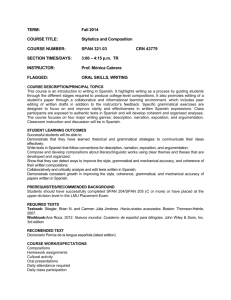
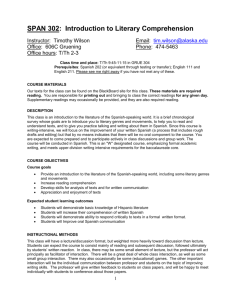
![[updated 1.27.16] - UF Spanish and Portuguese Syllabi](http://s3.studylib.net/store/data/009480414_1-bb401a03e72207b3aa9a3ee4243857b2-300x300.png)
